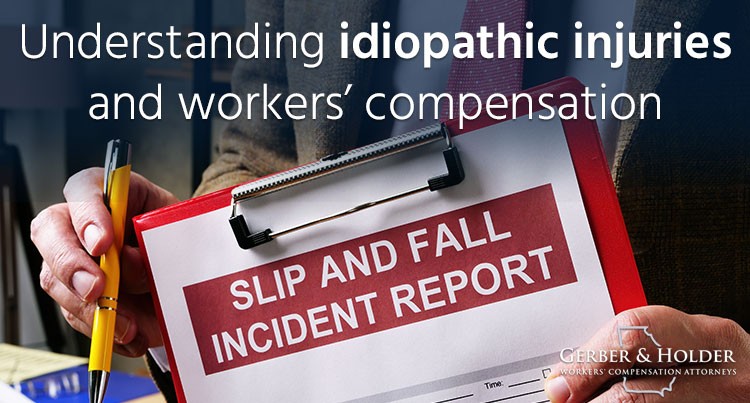
Understanding Idiopathic Injuries and Whether They’re Compensable
Insurance companies find many different ways to deny a claim.
One of these tactics is to claim that an injury is “idiopathic.” An idiopathic injury (in the context of workers' compensation) means that the injury has no known origin. In other words, the injury was not the result of a work related activity and ‘just occurred.' An example of this is an individual who is working and has a heart attack, not caused by their on-the-job duties.
Recently, a case involving an idiopathic injury was tried in the Georgia Court of Appeals. The outcome of the case would indicate that the idiopathic defense is still viable in Georgia. However, the case in question, Stoker v. Walker County Board of Education, resulted in the plaintiff being ineligible for workers’ compensation benefits.
First, some background on the case.
Ms. Stoker, a substitute teacher, was taking her class to the cafeteria down a straight, flat hallway. Ms. Stoker reported that she didn’t trip over any object nor was there any substance on the floor. According to her testimony, one minute she was walking and the next she was on the floor.
Under Georgia law, the claimant has the burden to prove the evidence in a case. As it was, Ms. Stoker and her attorney failed to prove a preponderance of evidence that her injury was caused by her employment.
This court’s decision is good news for employers, and bad news for workers.
While Ms. Stoker’s case failed to prove a connection between an idiopathic injury and her employment, other cases have been successful. In the cases of Cartersville City Schools v. Johnson and Frett v. State Farm Employee Workers’ Compensation, both workers were able to prove their injuries were, in fact, eligible for compensation.
In Cartersville City Schools v. Johnson, the claimant, Celia Johnson, fell and injured her knee after having to make a quick maneuver around the desks in her classroom. During her hearing, Johnson was able to prove that the configuration of the classroom, combined with acute stress on her knee, was responsible for the injury she sustained. Because of this, her idiopathic injury arose out of employment and was compensable.
Likewise, in the case of Frett v. State Farm Employee Workers’ Compensation, Rochelle Frett was injured when she slipped in water in the breakroom during her lunch break. Although the injury occurred during a break and wasn’t connected to work activities, the court ruled that Ms. Frett making her lunch was “reasonably necessary to sustain her comfort at work.” This made her injury compensable.
Idiopathic injuries and workers’ compensation
According to the Georgia Court of Appeals, idiopathic injuries are injuries that don’t have an explainable origin or those that are the result of an unknown cause. Idiopathic injuries could be tied to their employment or they could have no connection to their employment. It’s for this reason that it can be difficult to know whether or not an injured worker is eligible for compensation.
While it is possible to receive workers’ compensation for an idiopathic injury, the road to compensation can be difficult—as Ms. Stoker’s case attests to. In order to qualify for workers’ comp, the law states that the injury sustained must be directly connected or “arise out of and in the course of employment.” Since, by definition, idiopathic injuries don’t have an explainable origin, it can be challenging to prove that they arose from employment.
Furthermore, instances where a person’s employment can be proven to be a significant contribution to a worker’s injury—or where their employment puts an employee at an increased likelihood of experiencing an idiopathic injury—the injured worker could receive compensation.
Typically, workers’ comp claims are based on the specific fact of the claim. Take slip and falls, for example. There is a certain set of circumstances where falls are compensable. A fall that is the result of a non-work-related seizure in which the employee strikes an object while falling could receive workers’ comp, but a worker who just falls to the ground might not.
In the 3 cases presented here, the difference in these cases is that there was a hazard involved in the compensable outcomes.
It’s the complexity of such cases that highlights why it is important to hire an experienced workers’ compensation attorney, particularly if your compensation claim was denied or is being contested. An attorney familiar with such cases will be able to evaluate your specific case as well as your injuries and be able to determine whether you were wrongfully denied.
About Ben Gerber
Georgia workers’ compensation attorney Ben Gerber, the co-founder of Gerber & Holder Workers’ Compensation Attorneys, exclusively represents injured workers in Atlanta, Athens, Columbus and throughout the state of Georgia. He uses his deep knowledge of employment law and extensive legal experience to help injured workers get the maximum compensation they’re owed under state laws.